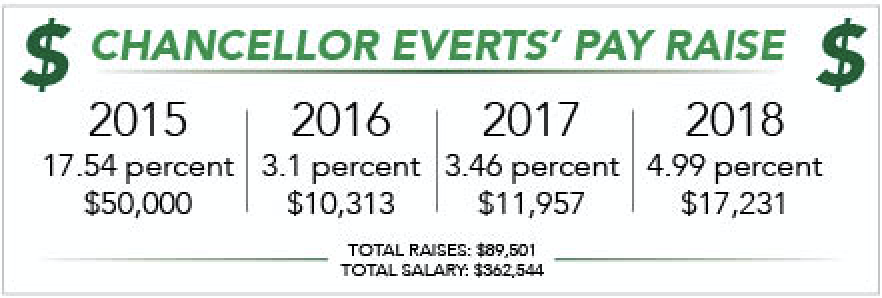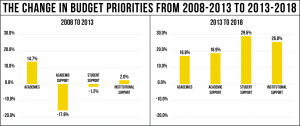Everts announces merit-based faculty salary raises
September 11, 2019
Chancellor Sheri Everts announced the reallocation of state funds to provide merit-based salary increases for faculty at the first Faculty Senate meeting of the school year Sept. 9 The promise of raises comes after Faculty Senate passed a resolution April 8 that pressured the administration to bring faculty salaries to the 80th percentile of peer institutions by 2021.
At Everts’ request, Provost Darrell Kruger, Vice Chancellor for Business Affairs Paul Forte and Vice Chancellor J.J. Brown examined App State’s budget over the summer for a way to develop a 4.99% pool capable of funding the salary increases. The group found room in the budget through the reallocation of state funding from student affairs to academic affairs.
Administration did not commit to reaching the 80th percentile in three years at the meeting.
In an email to Faculty Senate Sept. 7, Chair Michael Behrent reiterated the raises are based on reallocation only — not new state appropriated moneys. He also reminded the senate, as a merit-based raise, department guidelines will dictate the base pay increase per faculty member.
Everts addressed the changes to Faculty Senate at the beginning of the meeting.
“With four years of no merit-based faculty salary increases before my arrival on campus, I recognize there is a lot of catching up to do in this regard,” Everts said.
Last year, Everts received a 4.99% raise from the UNC System board of governors while faculty and non-faculty members, unsupported by the State Human Resources Act, did not receive raises. This prompted a series of actions by Faculty Senate.
On Feb. 11, Faculty Senate body created an ad hoc faculty salaries committee in response to the salary crisis. The committee’s 11 members met at least four times over the summer to discuss the potential for App State’s administration to commit to 80th percentile faculty salaries compared to institutional peers.
The Faculty Senate Budget Committee commissioned a report on faculty salaries in March that showed the App State faculty members’ salaries had declined relative to their institutional peers and cost of living in Boone.
“We really took seriously the comments from faculty and from senators about why this is a crisis,” Richard Rheingans, chair of the sustainable development department and a member of the ad hoc committee, said at the Sept. 9 meeting. “And we really tried to focus on three dimensions of this.”
The three dimensions he referred to were financial hardship, salary inversion and compression, and the threat uncompetitive salaries pose to faculty recruitment and retention.
Rheingans and fellow committee members made recommendations on how to achieve and maintain the 80th percentile goal in three years.
“To attain this goal in three years, we’ll need an infusion of significant merit-based salary dollars to remain committed to attaining this goal and compensate our faculty,” Kruger said.
He added that uncertain factors, such as the availability of internal and external resources and the parameters provided by the state for faculty merit-based salary increases will determine the feasibility of this goal.
















